01.12.16
Posted in Europe, Patents at 12:30 pm by Dr. Roy Schestowitz
Justice requires transparency, not darkness

Summary: Shedding light on the way in which managers in Munich’s EPO headquarters try to silence their critics and shoot the messengers, preventing even disclosure of these acts of silencing and shooting (potential firing)
Benoît Battistelli proudly claimed earlier today (mentioned just one hour ago by the EPO at Twitter) that there are “unprecedented levels of transparency”. One has to be seriously misinformed to actually believe him.
The EPO‘s management has not stopped attacking the unions, as we made very clear earlier this week. There’s just more secrecy. The management, or Team Battistelli in Munich, shows extreme hypocrisy as it’s apparently OK for management to ‘leak’ information about ‘investigations’ into board members (or judges) but not for ordinary members of staff to do the same. The EPO just tries to control the narrative and only the EPO’s ad hominem attacks on the accused are deemed acceptable. Reactionary comments about the accusers are deemed treasonous. What kind of institution has the EPO become and how can it ever expect to earn back the respect it once had?
“What kind of institution has the EPO become and how can it ever expect to earn back the respect it once had?”Several weeks ago we wrote about media coverage that was very critical of the EPO’s treatment of judges (see the JUVE translation from Techrights regarding EPO management and Battistelli). SUEPO has a new translation (not the same one) in English [PDF] and in other languages. To quote the public site, “JUVE comments on the failure of EPO President Benoît Battistelli to push his proposal of reform of the Boards of Appeal. Translations of the article are available in English, French, and Dutch.”
As we explained here in about a dozen articles before, “reform of the Boards of Appeal” is a euphemism or misnomer because the real goal — given the reluctance to fill empty poisitions and the eagerness to drive them away (among other factors) — is to crush them. It’s about “reform” to the same degree that union-busting is “investigation”.
In order to demonstrate what the EPO witch-hunts staff representatives for we’ve decided to share snippets of text and rebut based on our common sense and general understanding of the whole situation. Accompanying every snippet (or similar snippets from letters sent to different people) are our thoughts, not the thoughts of the accused (whom we never even spoke to anyway).

3 examples are aligned horizontally for the sake of comparison, showing how 3 staff representatives at the EPO were targeted with letters within less than a week since the first one (only days apart).

“Confidential” is ludicrous enough as it is given the nature of the allegations below; “Personal” is somewhat misleading because, as we shall show, several of the same letters were sent to several people. There’s nothing so personal about it. It’s almost impersonal. The original intent here was to divide and rule, i.e. prevent people from communicating with one another, then crush them in isolation. Solitude makes them weaker and makes legal defence more expensive if not altogether financially-prohibitive, thus unavailable, or too limited to be effective. Any request of secrecy needs to justify itself; just slapping the word “Confidential” on everything wouldn’t fly as it shows paranoia and gives the public reasons for suspicion, concern, and distrust. It typically breeds misconduct.
They seem to be using some very ancient office equipment to stamp these letters, so dreams of going fully digital/electronic still seem elusive at the higher floors of the EPO’s main Office.
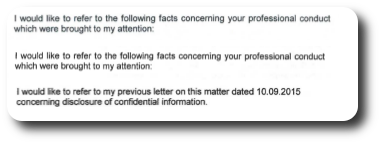
This opening template (3 letters) shows lack of creativity, does it not? A lot of these letters can probably be ‘folded’ onto just one with special extra phrases, specified for individual recipients. The person who did so was in fact so lazy or sloppy that a lady was referred to in the letter sent to her as “Mister”.
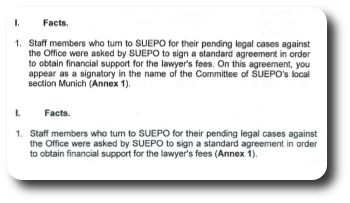
SUEPO sign-up is being targeted, but why? Is it because a massive new number of staff members has decided to join? Is somebody feeling threatened? How come all this time the EPO’s management had no issues with SUEPO sign-ups? Does it need to take examples from 3 years ago to suddenly claim that it’s wrong to join SUEPO? This kind of retreat to events from 2 years ago (or even further back) shows that the EPO is so utterly desperate for ‘dirt’ on convenient scapegoats that — just like the Stasi in East Germany — it is now ‘hitting’ the archives (mass surveillance) and scanning the shelves for pretexts and retroactive justifications. It even looks for informants with some character-assassinating ‘dirt’ that can be retrieved/reconstructed from several years ago. That’s what some call “scraping the bottom of the barrel.”
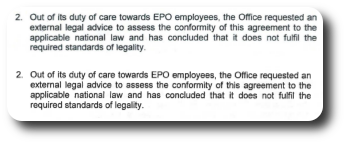
Here we have some repetition of an allegation and the appeal to “legality”, which — coming from the EPO’s mouth (after disregarding what was legal or illegal) — is laughable.
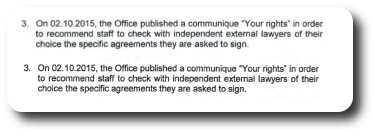
Here they are threatening staff and redefining or reframing rules so as to give feet to the accusations.

Now the EPO pretends — yet again! — that it finally cares about EU law and host states. This is comical. It’s like that time the EPO twisted British defamation law to silence critics. The EPO likes the laws of host states only when it suits the EPO’s crooked management.
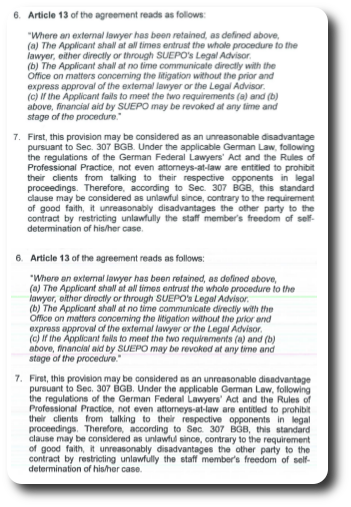
Here we have Lutz et al (probably) appealing to German law, which is funny given all that people have been saying about Lutz with his bizarre interpretation of German law (which he is supposed to understand). It was Lutz who put his name on the notorious “rights” statement — a controversial internal memo which served as a prelude to suspensions affecting SUEPO.

Here we can see a very hypocritical EPO. It says it cares for freedom of communication. Well, everyone must ask it why it threatens bloggers and gags its own staff, driving many people into the harbours of anonymity and pseudonyms (for their own protection). This isn’t the first time that the EPO pretends to care about freedom of expression, privacy, and so on. These are shots in the foot because people who say these things at behalf of the EPO beg to be ridiculed for their infinite hypocrisy.

The hypocritical EPO is now nitpicking on secrecy while ignoring risk of reprisal from an infamously aggressive EPO.

EPO pretends to care for national law again? Selective at best, pathetic at least.

So the EPO, an institution which disregards court orders and abuses a lot of staff (with ongoing ILO cases), pretends to speak for justice. That’s like BP speaking for climate or Microsoft speaking for Linux.

The EPO refuses to tolerate lawsuits against the EPO. Big surprise here. Having eliminated whatever was left of oversight, Battistelli now crushes anything which dares to challenge his (mis)conduct. That’s the hallmark of empires. Only civil disobedience or interference from the outside can put an end to it.
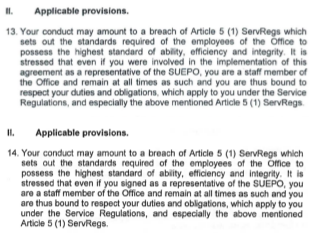
The hypocritical EPO talks about standards and accuses legitimate critics. Do they have any mirrors at the EPO building in Munich (high floors in particular)? Better yet, get some stakes and garlic, too. These people at the top fail to objectively assess what they themselves are doing and have been doing for years.
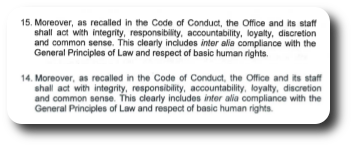
The hypocritical EPO remarks on basic human rights, respect, principles of law, common sense, accountability, integrity etc. Even a drunk official would be able to spot the hypocrisy when typing such a thing.
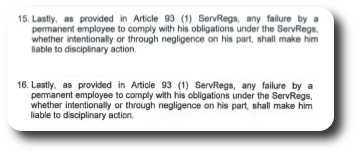
Here are the vague accusations of negligence, as if it doesn’t matter what explanation is given, the EPO’s accuser (and judge etc.) will reject it. This is not justice, it’s a “discharge” sheet.

This is epic hypocrisy on secrecy. Gag orders are fine for EPO management, but not for staff, even if for their own protection from an increasingly abusive management.

EPO hypocrisy on leaking details of an ongoing investigation. Didn’t EPO managers use the media to personally attack a judge just weeks after paying nearly a million bucks to a PR firm? Benoît Battistelli is becoming like Sheldon Adelson.

This is only confidential by EPO management’s definition. The motivation for secrecy is self-serving. Anyone with a clue can see that.

Watch how they are arrogantly reject the existence of more than one side in this mock ‘trial’, declaring opposing views invalid and disregarding them completely. That’s arrogance and self-righteousness.

EPO talks about integrity and ignores its own sins of compromising an investigation with Dutch and German media. That’s a recurring theme of hypocrisy or double-standard.

PR strategies employed, painting bullyish investigators [1, 2, 3, 4, 5, 6, 7] as the victims.
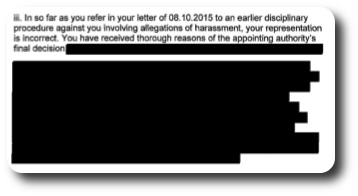
Arrogance is showing again. The representation is incorrect because we say so? What kind of pretense of justice is this?
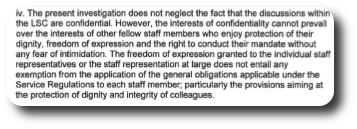
EPO management pretends to guard privacy of low-level workers rather than protect itself from accountability (and potentially prosecution).
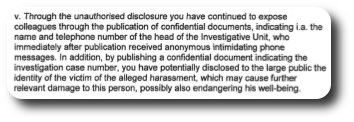
EPO guards the secrecy of its in-house Stasi and pretends that blowing this cover would expose the identity of poor victims. “Think of the children…”

Panicking that other offices become aware of the antics of EPO Munich management? Is that what it’s all about? It sure sounds like information itself, not people, is the enemy here.
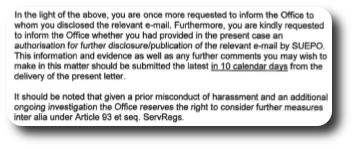
EPO Munich management evidently panics because it can see that the public knows what is happening and that things got out of hand.

This again is an EPO modus operandi, keeping not just the public but also workers and their representatives in the dark. We hereby declare a gag order because what we do here is embarrassing…
So there we have it. It is now easier for more people to see what the true nature of the allegations was all along. Seeing it in context, there is plenty of hypocrisy, a very low barrier/standard at hand, and plenty of manipulation by an increasingly paranoid EPO management. █
“Truth never damages a cause that is just.”
–Mahatma Gandhi
Permalink
 Send this to a friend
Send this to a friend
Posted in Microsoft, Vista 10 at 9:44 am by Dr. Roy Schestowitz
Microsoft installs real-time NSA surveillance on every PC

“I don’t want a back door. I want a front door.” — Director of the National Security Agency (NSA), April 2015
Summary: Microsoft is hijacking and compromising every PC that has Windows on it; even Microsoft boosters are starting to publicly complain
Once upon a time Microsoft pretended that its horrible malware/spyware was a ‘free’ limited offer. Nowadays, based on the latest moves from Microsoft, staying away from it is the limited offer. It is being imposed on all users because adoption has been abysmal and Microsoft needs to create the illusion that people still like Windows and want the latest version. Time to move to GNU/Linux?
“Time to move to GNU/Linux?”According to Robert Pogson’s catch, IDG‘s Microsoft boosters are now among those who complain about what Microsoft is doing. They explain how Vista 10 tries to infect PCs and spread itself (yes, like a virus). Here is the summary from Slashdot:
As you may recall, Microsoft has delivered KB3035583 as a ‘recommended update’ to users of Windows 7 and 8.1. What this update does is install GWX (“Get Windows 10″), a program which diagnoses the system to see if it is eligible for a free upgrade to Windows 10, and if so, asks the user if they would like to upgrade (though recently, the option to decline has been removed). Some users have gotten around this by editing Windows Registry values for “AllowOSUpgrade”, “DisableOSUpgrade”, “DisableGWX”, and “ReservationsAllowed” in order to disable the prompt altogether. This advice was endorsed by Microsoft on their support forums.
According to a report by Woody Leonhard at InfoWorld, the newest version of the KB3035583 update includes a background process which scans the system’s Windows Registry twice a day to see if the values for the four aforementioned registry inputs were manually edited to disable the upgrade prompt. If they were, the process will alter the values, silently re-download the Windows 10 installation files (about 6 GB in total), and prompt the user to upgrade.
Well, “more windows 10 horror stories [appear] on slashdot,” cubexyz wrote at the #techrights IRC channel last night, “the end is near”.
We’ve heard there is something inside the EULA that would discourage if not effectively prevent the victims from organising a class action lawsuit against Microsoft with its sheer aggression (Microsoft is only getting more aggressive, not less). If a small company was doing the same sorts of things its employees would risk arrests, but Microsoft is well-connected with the US government (and secretive units thereof), so it will get away with almost anything.
The noteworthy thing about the above (latest developments) is that even fans of Microsoft are starting to panic a little. They can get upset by Microsoft’s attempts to impose on everyone what Microsoft is after and some of their reactions are something along the line of, “Microsoft, what the Hell are you doing? I like you, but this is going too far!”
“The noteworthy thing about the above (latest developments) is that even fans of Microsoft are starting to panic a little.”Microsoft is, in many ways, worse than ever before. The media, nonetheless, would try to tell us that “Microsoft loves Linux” and one site is openwashing a spyware company with articles such as “Microsoft Continues To Make Everything Open Source” (published last night). This article’s headline is a lie because every core product across the entire range of them is proprietary; there is openwashing using selective little “open” marketing of some particular components that depend on the core products (a trap). Office, Windows, SQL Server, etc. are all proprietary, so who was the writer kidding (or trying to kid)? “Bigger companies,” the writer claimed, “fully understand the benefits that come from making their software products open source.” Well, when it’s openwashing, then the purpose is marketing. They don’t ‘get’ Open Source, let alone Free software. They demonstrably hate and attack software freedom. They’re preying on people. They’re spying on them. █
Permalink
 Send this to a friend
Send this to a friend
Posted in America, Patents at 9:21 am by Dr. Roy Schestowitz
Where money calls the shots corporations and their owners almost always get their way at the public’s expense

Summary: Commentary on the US patent system and why it has never quite healed itself, nor will it ever be able to heal itself if large corporations dominate political figures
BEFORE we were focused on the EPO we had been writing literally thousands of articles about the US patent system (USPTO), which is utterly dysfunctional, unjust, and detrimental to human progress.
IP Watch, a site mostly critical of the existing systems or frameworks, has just said that “More than 50 members of the United States Congress today sent a letter urging the US Department of Health and Human Services (HHS) and National Institutes of Health (NIH) to exercise their legal authority to require medical patents that have emerged from government-funded medical research projects to be licensed on reasonable and affordable terms for public use.
“It helps show that patents are often more to do with protectionism than innovation or public service. It’s about corporations, not about people.”“The letter [pdf], rooted in a growing public concern with the rising prices of prescription drugs, argued that failure to use this measure would drive an image that the American government funds projects with taxpayer money that allow profiteering from struggling patients and families rather than simply earning enough profit to provide for future research and the researchers’ own incomes.”
It is easy to spot the inherent problems here, seeing the absurdity of granting a patent monopoly, a government-enforced monopoly, derived from tax money which the government ordered to be given. It helps show that patents are often more to do with protectionism than innovation or public service. It’s about corporations, not about people.
A new article from bankers’ media alludes to the CLS Bank case, which is better known by the plaintiff’s name, Alice. Here is what it says about software patents:
A landmark case in this area was the 2014 decision in Alice Corp. v. CLS Bank, in which the U.S. Supreme Court ruled that patents on software related to an electronic escrow service were found to be unpatentable, since the patent’s claims were drawn from abstract ideas.
“I think there’s a movement in the courts and in Congress to restrict the scope of software patentability,” Knight said.
Yes, well, once upon a time there was a healthy debate out there about whether software patents should be abolished. Those days were gone after large corporations had hijacked the debates and warped these into debates about patent trolls (meaning small entities that typically use software patents, often against large entities/corporations). All of these “reform” (for large corporations) talks virtually vanished (from the media and from politics) right after the summer break. It all got squashed and lost all its momentum. This is politics. It’s total nonsense when it’s clogged up by sponsors, donors etc.
“…once upon a time there was a healthy debate out there about whether software patents should be abolished.”Florian Müller tells IP Troll Tracker (Steph): “I agree that a focus on trolls is poor justification for reform. Trolls are merely a symptom of the underlying problems.” He also asks “So you also feel that patent reform advocates have been too timid so far in their portrayal of problems and proposals?”
This was after he wrote a long rant about the role of political correctness (or maybe the sixth sense which is campaign contributions money) in the reluctance to put to rest the bad patent system which promotes extortion rackets. To quote the apolitical part (not GOP promotion):
U.S. patent reform advocates have been disappointed term after term, presidency after presidency. Washington has a “do nothing” reputation, but a sea change appears to be around the corner and it may also create an environment in which, at long last, the massive and dramatic problems caused by a broken patent system may be addressed more forcefully and courageously than before.
Political correctness has terrible effects because it prevents politicians, the media and the general public from discussing the real issues without mincing words, and when you can’t even talk about the real issues, you’re very, very unlikely to identify and implement solutions.
Political correctness is the root cause of many problems not only in such contexts as immigration policy or the problem with certain ethnicities’ crime rates.
There are many areas in which a dogma has been turned into an axiom. Even though I’m an environmentalist (my house has a groundwater heat pump and uses groundwater temperature for cooling), I’d like there to be a more open discussion of the causes of global warming. Just an example.
Political correctness is also a huge problem in the debate over U.S. patent reform. Organizations and individuals probably feared that they would be “anti-American” if they simply said that the U.S. patent system is broken and fails to serve true innovators.
In all those congressional hearings on patent reform that I watched, each and every politician repeated the mantra of the U.S. patent system being key to innovation and allegedly being the envy of the world, when the reality is that it’s the laughing stock of patent and industry professionals in the rest of the world. Over the years I’ve talked to so many patent lawyers from Europe and Asia, and even to patent examiners (though not the ones the EPO leadership accuses of having been in contact with me), about the overall situation, and no one believes that U.S. juries are qualified to determine infringement and validity issues, no one has ever disagreed with me that the Federal Circuit is generally too patent-holder-friendly, and no one has ever disagreed with me that the quality of USPTO-granted patents is generally even lower than that of European patents.
Impactful patent reform in the U.S. won’t happen until at least a significant percentage of all politicians and stakeholders participating in the debate will start to tell the truth, which is that most information and communications technology patents are invalid as granted, that a high percentage of all claim construction decisions are reversed on appeal, that even those patents that are not invalid and are ultimately deemed infringed generally don’t protect anything that justifies a 20-year monopoly, and that there is no point in incentivizing “being first to file” when the combination of copyright, trademarks, trade secrets, and the first-mover advantage in relatively fast-moving fields are more than sufficient to protect investment in innovation. Reform advocates must place more emphasis on the fact that ever more U.S. patents are not granted to U.S. companies, just like most European patents are not held by European companies. It must be said that the correlation between patents and innovation in a country is hardly a causation of patents promoting innovation, that patents increasingly serve as a substitute rather than an incentive for innovation, and that studies linking patents to innovation are often based on circular logic, considering each patent an innovation.
Less is more. How can anyone seriously believe that patent inflation has anything to do with increased innovative activity? Would anyone believe that merely printing more money creates prosperity? Reform advocates should talk about how to gradually bring the number of patents granted per year down to a fraction of the current rate.
The US patent system isn’t the only one permitting patents on software. Under the EPO’s regime (like Brimelow’s “as such” loophole) many companies apply for and get software patents in Europe. The patent lawyers like it because it means more business (income) for them. Looking at sites of patent lawyers (IAM for instance), we do find very recent evidence that the patent system doesn’t quite function as was originally intended (when patent laws were conceived as means as providing an incentive to those publishing their physical inventions). As part of Xiaomi’s notorious campaign to amass thousands of patents, it now reportedly buys Broadcom patents. So, here again we have hardware-related patents being passed around, sold, changed in terms of ownership/assignment, serving to show that as a reward for innovation patents don’t quite function, not as stated on the tin. They’re more like weapons or tools of coercion.
“One way to tackle these issues is to inform the public, not politicians, who are easily influenced by corporate cash (bribes/donations/revolving doors) and are therefore unlikely to become part of the solution.”“In an assignment dated 23rd October 2015 and recorded with the USPTO on 7th December,” IAM wrote, “US semiconductor company Broadcom transferred 19 US patent assets to an entity named Xiaomi H.K. Ltd.”
In similar news, “Qualcomm asks U.S. court to force Apple, Samsung and others to surrender documents” and “Public patent licensing company index declined 24.4% in 2015″.
The term “patent licensing company” can be viewed as a gentler term for patent trolls, such as the Microsoft-connected Acacia, which habitually attacks Linux with patents. According to this report from IAM, Acacia is not doing too well. To quote: “Capping off 12 months of slumping share prices was the resignation in late December of Acacia CEO Matthew Vella. His exit came after the NPE was on the wrong end of a damaging decision in the Eastern District of Texas as a jury found in favour of the defendants, including Alcatel Lucent, ruling that the Acacia patent was invalid and not infringed. If that ruling had gone the other way it’s fair to say that Vella would probably still be in a job.”
Irrespective of this one patent troll and putting aside the impact of Alice on software patents, the problem is far from resolved and some of Müller’s observations (not the political slant) have earned praises from critics of the patent system, such as Jamie Love. One way to tackle these issues is to inform the public, not politicians, who are easily influenced by corporate cash (bribes/donations/revolving doors) and are therefore unlikely to become part of the solution. █
Permalink
 Send this to a friend
Send this to a friend
Posted in Europe, Patents at 8:33 am by Dr. Roy Schestowitz
Calm before the storm?

Summary: On the surface, things may seem calm at the EPO, but under this façade lie very serious issues, whose affected parties are banned from speaking about
LATER TODAY we will release some EPO material which we hope will remind people why the EPO is dangerous. Everyone at the EPO’s management tries to play up the UPC while EPO scandals continue to surface and according to this survey from WIPR:
Developments in Europe concerning trademark reform and the Unified Patent Court (UPC) were noted by respondents as the most important changes.
At the close of the year, the European Patent Office announced that the unitary patent was “legally” and “technically” ready for lift off. However, UPC member states are still waiting for the ratification by the UK and Germany (as well as a number of other countries).
In May, the UPC took a major leap forward after Spain’s challenge to the legality of the agreement was struck down by the Court of Justice of the European Union.
“SUEPO resumed their posting on http://www.suepo.org page,” one person told us (SUEPO’s public page updated for the first time in four weeks). There is also this new (corrected) press release about controversial patents on cancer treatments at the EPO. Other than that, the EPO has been reasonably quiet. It has been almost invisible, maybe by intention. The EPO Forums (based on proprietary software by the looks of it) that have been there for several years and attracted only a few hundreds of threads are quite miserably being promoted in Twitter this week. It’s likely or at least possible that even the forums in SUEPO attracted more activity than the EPO Forums. Heck, even IP Kat comments about the EPO are more frequent than postings in the EPO Forums. How pathetic is that?
As a comment from IP Kat put it the other day:
2016!.. another year of “Esprit de service” among the BB [Benoît Battistelli] goon squad, a group that is amiable in the extreme, looking for full concurrence on every topic, with a complete absence of upsetting bickering that could ruin their cosiness. A comfortable consensus built around an illusion: that everyone in the squad had a perverse addiction to power. Yet no one questioned it. The main victim of the EPO’s “Esprit de service” is critical thought, which leaves behind a muddy trail of irrational…actions.
Later today we are going to release something new. There is no reason to withdraw EPO flak as all the EPO abuses persist and no reparations or revocations have been reported as yet.
It sometimes seem like keeping a low profile became the PR strategy of the EPO in 2016. That was the NSA’s strategy before Snowden leaked a lot of documents to the press. █
Permalink
 Send this to a friend
Send this to a friend
Posted in Europe, Patents at 8:10 am by Dr. Roy Schestowitz
English/Original
Publicado in Europe, Patentes at 5:57 pm by Dr. Roy Schestowitz
Yendo tras los chivos expiatorios a la cabeza sólo retrocedería la patentización así que…

Sumario: Una mirada a lo que básicamente constituye otra fase en el esfuerzo de la OEP de despedir críticos y asustar al resto de ellos.
No ha habido muchas sugerencias públicas acerca de la OEP últimamente. La OEP cuentas (web site, twitter, etc.) con las justas están activas, los administradores de la Unión de Empleados de la OEP (SUEPO) están fuera, y el ¨presidente de la OEP el señor Batistelli¨, nos dijo una persona hoy, ¨estarán en Colombia, SudAmerica en Enero 29, hablando de las Patentes Unitarias. Aquí tenemos evidencia que el CABILDEO DE LA UPC continua. NO INTERFERIRÁS EN LOS PLANES DEL seńor BATISTELLI.
“La gerencia de la OEP ha cometido un grave error cuando intentó silenciar opositores en vez de apaciguar por entendimiento mutuo, concesiones, reconocimientoes, etc.”Una protesta de empleados [cref [cref viene en una semana y media (apoyo para los empleados de la OEP unión esta alto ultimamente)], concidiendo con algunas decisiones acerca del futuro de los representantes de los empleados.
La gerencia de la OEP ha cometido un grave error cuando intentó silenciar opositores en vez de apaciguar por entendimiento mutuo, concesiones, reconocimientoes, etc. Varios miembros pasan volantes entre ellos, el boletín de la SUEPO, links a sitios de noticias, su sitio web, y así. Mientras más gente lee, más gente apoya a las uniones y recela de su gerencia. Los empleados están mayoritariamente en apoyo de la SUEPO, sigue lo que SUEPO dice, sea en su web site, o los boletines ocacionales. Solía ser ¨SUEPO Informa¨, un lector nos dijo, y era un simple asunto de The Hague.. Hubom mas on menos cuatro encarnaciones de SUEPO, uno por cada sitio [DH, BE,MN, VI], En adición a la representación de sus empleados, con diferentes agendas y personalidades. Batistelli parece manejar lo impensable: Une los sitios en una fuerza.¨
“Batistelli parece manejar lo impensable: Une los sitios en una fuerza.”
–AnónimoLas acusaciones contr las cabezas de la SUEPO son chocantes no por que son severas pero por que son indicativa de un desesperado efecto de la gerencia de la OEP de APLASTAR todas las uniones (comenzando con la más grade, SUEPO). Si todo sigue como lo planeado, dentro de pocos días empleados de la OEP serán notificados de esas rídiculas acusaciones. No hay proceso judicial, como no hay separación entre acusador, juez, y ejecutor, etc. Es un CIRCO! Teatro. Designado para dar la impresion de debido proceso, pero es hecho en secreto, por que sigue los standares de North Korea. Avergonzaría a cualquier pais de Europa, incluso aquellos que fueron parte de la Unión Sovietica. Abajo con Batistelli! █
Permalink
 Send this to a friend
Send this to a friend
Posted in News Roundup at 7:51 am by Dr. Roy Schestowitz

Contents
-
Desktop
-
Most of the top Linux distributions are of the “easier to use” variety. Some observers might dispute this, but the fact is that most people not working in IT or software development will gravitate toward the easiest experience when it comes to Linux.
In this article, I’ll share my top picks for best Linux distro for newcomers. These selections are chosen based on their ease of use, not their potential for “learning Linux.” I hope to put to bed once and for all that myth that all who use Linux need to have a strong familiarity with how Linux works. After many years of casual usage, I can say for certain that this will tend to itself over time.
-
Windows 10 has been out in the wild for a while now. For the most part, people have been really liking it. It’s probably the most streamlined version of Microsoft’s operating system to date. Still, some people aren’t happy with the upgrade and are looking at alternatives.
Introducing Linux: it’s a free and open source platform which many operating systems are built upon. If you’re looking to move from Windows to an alternative, here are eight compelling reasons why you should leave Microsoft for a more free and open source operating system.
-
Kernel Space
-
Linux, the kernel developed and distributed by Linus Torvalds et al, contains non-Free Software, i.e., software that does not respect your essential freedoms, and it induces you to install additional non-Free Software that it doesn’t contain.
-
The guys over at the GNU Linux-libre project have had the great pleasure of announcing the release and immediate availability for download of the GNU Linux-libre 4.4 kernel on January 10, 2016.
-
Now that Skylake Xeon processors are appearing at major Internet retailers in sufficient quantities (such as the recently reviewed Intel Xeon E3 1245 v5), prices on older-generation Xeon CPUs are falling further. With prices on DDR3, SSDs, and Haswell-compatible motherboards also continuing to fall, it’s possible to build a sufficiently powerful yet cheap Haswell Xeon system.
-
-
Kernel version 4.4 is released, it’s time for our regular look at what’s in store for the Intel graphics driver in the next release.
-
Ingo Molnar has already been sending in his many Git pull requests for the newly-opened Linux 4.5 merge window.
-
The cgroup v2 interface will be made official with the in-development Linux 4.5 kernel.
Maintainer Tejun Heo sent in the cgroup changes today for the Linux 4.5 merge window. About the new interface he notes, “cgroup v2 interface is now official. It’s no longer hidden behind a devel flag and can be mounted using the new cgroup2 fs type. Unfortunately, cpu v2 interface hasn’t made it yet due to the discussion around in-process hierarchical resource distribution and only memory and io controllers can be used on the v2 interface at the moment.”
-
Linus Torvalds yesterday released the Linux 4.4 kernel. This is a long-term support (LTS) release, as was determined at the Linux Kernel Summit and announced in October by Greg Kroah-Hartman, who will maintain it for 2 years.
This release checks in at more than 20.8 million lines of code, which is up considerably from Version 4.1, released in June 2015 with slightly more than 19.5 million lines of code, according to Phoronix. For historical comparison, version 0.01 of the Linux kernel — released in 1991 — had just 10,239 lines of code (source: Wikipedia).
-
Summary: This release adds support for 3D support in virtual GPU driver, which allows 3D hardware-accelerated graphics in virtualization guests; loop device support for Direct I/O and Asynchronous I/O, which saves memory and increases performance; support for Open-channel SSDs, which are devices that share the responsibility of the Flash Translation Layer with the operating system; the TCP listener handling is completely lockless and allows for faster and more scalable TCP servers; journalled RAID5 in the MD layer which fixes the RAID write hole; eBPF programs can now be run by unprivileged users, they can be made persistent, and perf has added support for eBPF programs aswell; a new mlock2() syscall that allows users to request memory to be locked on page fault; and block polling support for improved performance in high-end storage devices. There are also new drivers and many other small improvements.
-
Applications
-
Kodi, a media player and entertainment hub that was named XBMC until last year, has been upgraded once more. Developers have pushed the last Beta for the 16.0 branch.
-
I love Kodi. (This is just an evolution of my love for XBMC, since it’s the same thing with a new name.) In fact, although I’ve expressed my love for Plex over and over (and over) the past few years, I still use Kodi as my main interface for the televisions in my house. We gave Plex a try as our main media center software when it was released for TiVo, but after several months, we found its interface to be cumbersome and the transcoding for local media frustrating.
-
-
Just a few minutes ago, January 11, 2016, Paul Davis had the great pleasure of announcing the first update of his impressive Ardour open-source DAW (Digital Audio Workstation) in 2016, version 4.6.
-
-
The Synaptic Package Manager, an open source piece of software that is being used in various GNU/Linux distributions to install, remove and update software packages, has been updated today to version 0.83.
-
Instructionals/Technical
-
Games
-
We Are The Dwarves was sent in by the developer, and my my, it looks quite good actually. Certainly one of the more unique settings for a game that has come across my emails recently.
-
-
-
-
Medieval II: Total War Collection is going to be released on Steam later this week for both Mac and Linux systems.
Mixing real-time battles and turn-based strategy, the only difference between you and proper olden days royalty will be how closely related your parents are.
-
Feral Interactive has revealed that the Medieval II: Total War Collection will be landing on Steam for Linux and Mac OS X in a few days.
-
-
-
Desktop Environments/WMs
-
K Desktop Environment/KDE SC/Qt
-
Once again, KDE developer Kai Uwe wrote yet another in-depth article about some of the upcoming features of the next major release of the KDE Plasma 5 desktop environment, version 5.6.
-
As you may or may not know, Plasma’s mantra basically is “help you get stuff done”. This means it helps you to achieve your goals as easily for you as possible. Plasma 5.6 will be one of those releases where we’ve focussed a lot on getting in your way less and removing obstacles in the way between you and your tasks.
-
-
GNOME Desktop/GTK
-
The majority of the work I’ve been doing so far with Codethink has been to build and integrate a GNOME reference build with the Baserock build system.
[...]
I’ll probably return at some point to give a more thorough explanation of exactly what Baserock is and what it is not, but that is not the point of this post, suffice to say that it is a build system and as of the close of 2015 it includes a reference build of GNOME which is quite functional and fairly well integrated.
-
One of the things necessary in an IDE is the ability to create projects from templates. This is something we’ve been lacking since the beginning, and I’m finally in a position to follow through on it.
-
Note that you can write build system implementations in Python or Vala now. That should lower the barrier for contributions quite a bit.
-
-
Your Linux distribution of choice says a lot about you. Of course, one of the many great things about Linux is the diversity of options you have to choose between. Maybe you like a slimmed down minimalist option. Maybe having all of the bells and whistles is important to you. Or maybe you just prefer a distribution that you find easy to use.
Whatever your preferences, chances are, there’s at least one distribution out there that’s a perfect fit for your needs. Because of the huge number of choices, which we couldn’t possibly list all here, we relied up DistroWatch.com to provide us with a starting point of the ten highest ranking distributions from the past twelve months.
-
Reviews
-
Linux distros with a variety of lightweight desktop environments are nothing new. Most of the choices already available work well and are more advanced than Budgie.
If Budgie is going to gather any traction, the developers must push the envelope and offer a desktop with more functionality and completeness. At this point, the Solus Project has too many reasons for users to stay clear of trying it.
-
I tried running Solus in two test environments, a physical desktop computer and a VirtualBox virtual machine. Solus worked fairly well inside the VirtualBox environment, though it did not integrate with VirtualBox and I could not access my display’s full resolution. As VirtualBox’s guest modules were not available in Solus’s software repositories, I downloaded the official guest modules from Oracle and installed those. After a reboot, I was able to run my Solus guest with full screen resolution. Unfortunately, the Budgie desktop was still sluggish to respond. I tried experimenting with and without 3-D effects enabled and Budgie was always slow to respond and programs were slow to open. The operating system used approximately 270MB of memory when logged into the Budgie desktop.
-
Today in Linux news, two Solus reviews found issues with the newly stable 1.0. FOSS Force’s Best Desktop Distro poll finds Arch still leading the pack and Derrik Diener posted 8 reasons to switch from Windows 10 to Linux. A couple of Tumbleweed posts catch us up while Clem Lefebvre officially releases Mint 17.3 KDE and Xfce.
-
Arch Family
-
The development team behind the BlackArch OS, a GNU/Linux distribution based on Arch Linux and designed from the offset to be used for all sorts of penetration testing and security auditing operations, have announced the release of BlackArch 2016.01.10.
-
Ballnux/SUSE
-
-
Leap 42.1 started out with some UEFI problems. The last of those were fixed in an update yesterday. However, the fix only solves the problem for already installed systems. The install media still have these problems. Since opensuse usually does not re-release install isos, it is unlikely that install problems will completely go away.
-
Red Hat Family
-
Six months of conversations with managers, leaders, and readers in the Open Organization community have taught me this important lesson. And those conversations almost inevitably raise the following question: What’s next? How can we begin putting open organizational practices in place? Where will open thinking eventually lead us?
-
BMO Capital Markets initiated coverage on shares of Red Hat Inc (NYSE:RHT) in a research note issued on Thursday, The Fly reports. The brokerage set an “outperform” rating and a $97.00 price target on the open-source software company’s stock. BMO Capital Markets’ price target suggests a potential upside of 23.30% from the stock’s previous close.
-
-
-
Fedora
-
We’ve covered the development cycle of the Fedora 24 Linux operating system Fedora 23 was still in Beta, informing you guys about its upcoming features as we got our hands on them, but now the time has come to make a summary of them all.
-
First up would be an Astronomy spin, which would provide “a complete toolchain for both amateur and professional astronomers.” This would basically be a spin of Fedora 24 that includes KStarts, astropy, AstrOmatic, and other astronomy software components installed by default.
-
As reported last night, Fedora 24 needs a few extra weeks to rebuild everything with GCC 6 and tonight the request was approved. Elsewhere, Caitlyn Martin had troubles with Debian 8.1 and Christopher Shaw said Ubuntu needs a “firm direction.” Daniel Vrátil reported on the progress with Akonadi saying, “Human-readable formats are overrated” and Ken Vermette posted a book review of KDE Plasma 5.5.
-
Go 1.6 is expected for release in February and so it simply makes sense going for this new version with Fedora 24 due for release now in late May or June. Go 1.6 adds experimental ports for 64-bit MIPS Linux, Android on 32-bit x86, support on FreeBSD for compiling under Clang by default, transparent support for HTTP/2, runtime improvements, and a wide variety of other changes. There are not, however, any changes to the programming language itself with Go 1.6.
-
The latest MirrorManager release (0.6.1) which is active since 2015-12-17 in Fedora’s infrastructure has a few additional features which provide insights into the mirror network usage.
-
Debian Family
-
Derivatives
-
I recently dug through my history of involvement with TeX (Live), and found out that in January there are a lot of “anniversaries” I should celebrate: 14 years ago I started building binaries for TeX Live, 11 years ago I proposed the packaging TeX Live for Debian, 10 years ago the TeX Live packages entered Debian. There are other things to celebrate next year (2017), namely the 10 year anniversary of the (not so new anymore) infrastructure – in short tlmgr – of TeX Live packaging, but this will come later. In this blog post I want to concentrate on my involvement in TeX Live and Debian.
-
Canonical/Ubuntu
-
We have just been informed by Mr. Łukasz Zemczak of Canonical about the latest and hottest news that happened in the Ubuntu Touch world during the day of January 11, 2016.
-
Ubuntu 16.04 LTS (Xenial Xerus) is still a month away from feature freeze and developers have plenty of time for some new features, but the distribution has already received a lot of attention already.
Canonical has been focused on Ubuntu Touch these past two years, so there hasn’t been much activity on the desktop front. That’s about to change as the Ubuntu developers have already implemented (or are planning) a huge number of new features, and some of them are really surprising.
-
Flavours and Variants
-
Linux Mint has long proven to be one of the most popular desktop distributions around. And now the Linux Mint developers have released version 17.3 for KDE and Xfce.
You can download Linux Mint 17.3 KDE and Xfce right now from the Linux Mint site. You can also read the release notes and what’s new for Linux Mint 17.3 KDE, as well as the release notes and what’s new for Linux Mint 17.3 Xfce.
-
-
Whereas most other Amlogic S905 boxes have adopted the typical cost down approach, MINIX has done the reverse and built what they believe will be the number one Android box on the market. Their newest device, the NEO U1 is expected to surpass their own high-end flagship model – with more features at a lower price.
If you’re unfamiliar with MINIX NEO, this Android-powered device transforms any conventional TV or monitor with an HDMI connection into a Media Center / fully functional PC. Enabling you to run Apps, browse the Internet, access Google Play Store, Netflix, Skype and even comes pre-installed with a new custom version of KODI which uses an audio pass-through mechanism not found on any other versions of KODI on the Android platform.
-
At last week’s CES show in Las Vegas, some of the most intriguing new gadgets were flying about within mesh fabric cages, crawling around robot pens, or ready to roll off their pedestals to cruise the Strip. And a growing number of these frenzied fiends run Linux.
The most prominent mobile devices at CES were not boring old mobile phones or tablets, but unmanned autonomous vehicles, better known as drones. New Linux-based UAVs include Parrot’s fixed wing Disco, Zerotech’s Snapdragon Flight based Ying, as well as new autopilots that turn a Raspberry Pi board into a flight computer (see below). These newcomers were joined by other recently announced Linux drones, such as the indoor-ready Fleye and Parrot’s BeBop 2.
-
ASRock unveiled what it says are the world’s first Mini-STX motherboard and mini-PC, based on 6th Gen Intel Core (“Skylake”) processors, up to 65W TDP.
-
The platform can be seen as a hardware-assisted software receiver where computational complex methods are implemented on digital FPGA hardware whereas algorithms can be developed and implemented on receiver side on a user-friendly GNU/Linux system. A transparent access to the hardware is made available via the Open GNSS Receiver Protocol that gives deep access to the hardware control and enables deepcoupling of inertial sensors and optimized precise positioning solutions.
-
Phones
-
Tizen
-
Last week, Dr. Hong, the President of Samsung SDS and the Head of its solution business, delivered a keynote at CES 2016 that focused on the Internet of Things (IoT) and how this can impact on our lives today and in the future.
Samsung has an ever expanding range of devices and appliances that can Interact with the SmartThings ecosystem, like the new range of 2016 Samsung TVs which can actually act as the IoT Hub of your house. We have a Family Hub refrigerator, that has a large 21.5-inch LED display built in, which you can use it to order your groceries, check your family calendar, play media (pictures, audio, video) and more.
-
The Evolution kit series from Samsung had long been a life saver for its older HDTVs and helped them stay relevant for a few more years. For those unaware, Samsung’s Evolution kit is a standalone device that had the processing power and other smart features of the more recent TVs and would connect to the older TVs to bring them to current gen standards giving them capabilities to play 4K content, connect to WiFi, MHL connectivity, etc.
-
-
Android
-
Lenovo announced an Android phone using Google’s Project Tango technology, and Intel released a Project Tango development phone with its RealSense camera.
When Lenovo acquired Motorola from Google in 2014, Motorola’s “Advanced Research and Projects” (ATAP) group and Project Tango computer vision project stayed with Google. Now, however, Lenovo is moving forward with a Project Tango based smartphone that will go on sale this summer for under $500. The device will run Android on an unspecified Qualcomm Snapdragon SoC.
-
The CyanogenMod project is the quintessential open source success story. It’s got open source code, an individual hacker burning the midnight oil, and community endorsement that led the project to the big leagues. From a forum board to the executive board, the CyanogenMod project has come a long way riding on the shoulder of its community of users and developers.
With over 12 million active users as of June 2014, CyanogenMod is the most popular free and open source aftermarket firmware for Android smartphones and tablets. The tricked-out version of Android replaces the stock OS that ships with your device and essentially gives you more control over it.
-
-
Do you own a Bentley? Do you also enjoy spending over $9,000 on subpar Android phones? Well if you’re a member of this group that undoubtedly (probably) includes Adrian Grenier and Bret Michaels, Bentley and Vertu have joined together to rebrand an existing a phone just for you.
The Signature Touch for Bentley is the latest phone from luxury phone maker Vertu, and the third handset in the Bentley-Vertu partnership. If you’re thinking, is this the same Signature Touch phone that came out last September? Why yes! You would be correct. BUT! There is a “3D Bentley logo” on there, and Bentley promises to deliver exclusive content through a unique Bentley app that will seemingly be exclusive to the device.
-
Moving from an iOS device to Android won’t become much easier, despite an earlier report to the contrary.
-
-
Neffos is the new brand established by TP-Link for its first entries in the smartphone market. The Neffos C5L, Neffos C5, and Neffos C5 Max by TP-Link are the first three smartphones aiming to carry the flag for the brand.
All three Neffos smartphones run on Android 5.1 Lollipop, skinned with lightweight-looking proprietary launcher.
-
According to comScore, 195.6 million Americans owned a smartphone by the end of the three-month reporting period, of which more than half had their phones running on Google’s “Android.” The Android operating system (OS) now holds more than 53% of the smartphone market share in the U.S. and is expanding each quarter. (Source: “comScore Reports November 2015 U.S. Smartphone Subscriber Market Share,” comScore, January 7, 2016.)
-
While many of us are still waiting for an update to Android 6.0, dubbed Marshmallow, we can be sure that Google is hard at work on the next version of Android. Since Material Design and the Google Play Services became integral parts of Android it’s hard to think that Android 4.0 and such are even the same operating system these days. As we look ahead to the next version of Android, it appears that Nutella could be the name for Android 7.0, or perhaps Android 6.1? Regardless, many of the new features and changes for Nutella have been rumored and whispered about for some time now and some of them could be the biggest changes to how we use our Android devices.
-
-
-
-
-
-
-
-
-
-
-
-
Okay, it’s 2016, and it’s time to accept something: the iPhone is not the only phone in the world. Android is not inferior to the iPhone. So when it’s revealed to you that someone has an Android phone, it’s time to stop responding with these totally outdated, not to mention, condescending, remarks. Because Frankly, Android shaming is getting really old.
-
Welcome, one and all, to 2016. I wish every one of you a happy and prosperous new year.
I have been meaning to write this column for a while. It is one part observation, one part lecture, and mostly utter rambling, so please do stay with me. I hope that, if nothing else, this column shares an important insight that came to me a while back that you may find interesting.
-
Carrie Raleigh is the STEM program manager for Girl Scouts of San Gorgonio in California where she says they are much more than a cookie program. Girls Scouts has been coordinating experiences to help teach girls life skills for over 100 years, and as our world changes, they will need to as well. To learn the right skills for our current world, Girl Scouts is focusing their efforts on teaching girls about robotics, cybersecurity, coding, gaming, and gaining STEM (Science, Technology, Engineering and Math) career exposure.
-
Events
-
Sure you go to Linux expos such as SCALE to sharpen your coding skills and to learn about how to get your hands dirty going under the hood with you favorite open source applications. You might even go to learn a little bit about the business of open source. But you have to admit that an added attraction is just getting to see presentations from FOSS rock stars, the well known movers and shakers who have taken a big part in shaping the past, present and future of free and open source software. These are people whose presentations you’ll be tempted to attend no matter what the subject because…well, just because. Some of these are legends; some are not. But they’re all rock stars. And as usual, there’ll be an abundance of them at SCALE.
-
In a week and a half I am flying out to Pasadena to the SCALE14x conference. I will be there from the evening of Wed 20th Jan 2016 to Sun 24th Jan 2016.
-
David Thompson will be giving a talk about Guix on January 20th at the BLU gathering at MIT in Boston, Massachusetts (USA).
-
SaaS/Big Data
-
Last year was a giant one for Apache Spark, now one of the most talked about data analytics tools going. Not only did the project graduate to Top-Level Status at Apache, but IBM made a huge financial commitment to it. Late last year, Databricks, which was founded by Spark’s creators, revealed that an increasing number of users are choosing to complement or replace Hadoop tasks with Spark processes.
-
Manthan, which specializes in Big Data and analytics for retailers and other businesses has overhauled its Customer Marketing solution for Hadoop, adding data management, auto-scale and real time computing capabilities to its existing analytics arsenal. Manthan also has an interesting infographic out on the “consumerization of analytics.”
-
-
ownCloud, an open platform that anyone can leverage to create their own cloud platform, has been getting a lot of attention for its flexibility, and because interest in private clouds is on the rise. You can move beyond what services such as Dropbox and Box offer by leveraging ownCloud, and you don’t have to have your files sitting on servers that you don’t choose, governed by people you don’t know. We’ve provided several guides for getting going with it.
-
It’s not yet official, but the names of the ‘N’ and ‘O’ OpenStack releases have been voted on and there is a (preliminary) pair of winners.
-
CMS
-
Congratulations to the developers and community that supported Django CMS on their win. For those of you who have never had a chance to try Django, there’s never a better time than the present. Head on over to their website and give them a whirl, you might just find yourself a new favorite!
-
Pseudo-/Semi-Open Source (Openwashing)
-
Its name is N1 and since it’s open source (and published on GitHub), it promises to never be bought and shut down.
-
LLVM
-
As of a few days ago in the latest LLVM development code is support in the AMDGPU back-end for using the new linker.
Thanks to this work by AMD’s Tom Stellard, the AMDGPU back-end now supports LLVM’s new linker.
-
-
FSF/FSFE/GNU/SFLC
-
The GnuCash development team announces GnuCash 2.6.11, a snap release to fix a QIF import regression and the eleventh maintenance release in the 2.6-stable series. Please take the tour of all the new features.
-
The GNU Health developer announced the release today of Health 3.0. GNU Health is “a Free/Libre project for health practitioners, health institutions and governments. Its modular design allows to be deployed in many different scenarios: from small private offices, to large, national public health systems. It covers the functionality of Electronic Medical Record (EMR), Hospital Management, and Health Information System (HIS).”
-
So, why should we bother if we already have Android, some might ask? If it’s just because of some binary blobs, one could just use Replicant, right?
Well, one of the problems is that Android development is done in hiding, and pushed downstream when a new version is launched. There is no community behind that anyone can join. Replicant ends up either following it or staying behind. It could do a fork and have its own innovations. And I am all for it. But the lack of manpower for supporting devices and keeping up with the latest versions and security fixes already takes most of the time for the one or two developers involved.
Also, Android has a huge modularity problem, that I will discuss further below. But it’s hard to replace many components in the system, unless you replace them all. And that also causes the problem that applications can hardly share extra components.
I would rather see Debian running on my devices and supporting good environments and frameworks for all kinds of devices, like phones, tablets, TVs, cars, etc. It’s developed by a community I can join, it allows a diverse set of frameworks and environments, and it’s much easier to replace single components on such a system.
-
-
Licensing
-
In 2015 there were a variety of legal issues of importance to the FOSS (free and open source) community.
-
Programming
-
Hardware
-
Intel has confirmed that its Skylake processors suffer from a bug that can cause a system to freeze when performing complex workloads. Discovered by mathematicians at the Great Internet Mersenne Prime Search (GIMPS), the bug occurs when using the GIMPS Prime95 application to find Mersenne primes.
-
Health/Nutrition
-
On Tuesday, Governor Rick Snyder declared a state of emergency due to lead in the water supply. The same day, the U.S. Department of Justice announced that it is investigating what went wrong in the city. Several top officials have resigned, and Snyder apologized. But that’s only so comforting for residents. They’re drinking donated water supplies—though those donations are reportedly running dry—or using filters. Public schools have been ordered to shut off taps. Residents, and particularly children, are being poisoned by lead, which can cause irreversible brain damage and affect physical health. It could cost $1.5 billion to fix the problem, a staggering sum for any city, much less one already struggling as badly as Flint is.
-
Security
-
-
I am still trying to figure out the events that led to this intrusion. I’ve read almost everything there is to read on Google’s Gmail pages, without finding much. Google seems adamant about not giving-out one-on-one help, but maybe I just didn’t look long enough. On my own, I’ve evoked two step verification on my main email addresses, so that’s settled. But still…I’d like to figure out when and how this breach took place. What magic sequence of events happened to allow this?
Did I mention I’m a security idiot? Yeah…I thought I did.
It feels strange to again delve into antivirus and malware protection. I’ve been a smug, self-assured dummy when it comes to online threats and Linux in general. And while what happened can’t really be blamed on Linux per se, it happened in a Linux neighborhood, so I am going to arm myself against any and all malware comers
Although I’m not above paying for good software, trying to discern what software is good and which is shiny junk can be a daunting challenge, especially in the Linuxsphere. In the tests I’ve studied over the past four days, ClamAV seems to be an online favorite, but they lack the one thing I am going to need on our Reglue kid’s computers: a friendly, useful graphical interface. I’m not going to tell an 11-year-old to drop to the command line to do anything, even if they do need to learn that the blinking prompt can make magic things happen. In time, I will teach them, but for now…. ClamAV failed the initial tests.
-
Cyber attacks are getting evil and worst nightmare for companies day-by-day, and the Distributed Denial of Service (DDoS) attack is one of the favorite weapon for hackers to temporarily suspend services of a host connected to the Internet.
Until now, nearly every big website had been a victim of this attack, and the most recent one was conducted against the BBC’s websites and Republican presidential candidate Donald Trump’s main campaign website over this past holiday weekend.
-
A bug bounty program is among the most impactful additions to a software security process. With a bug bounty program, security researchers submit reports on potential vulnerabilities, typically with the promise of a reward or “bounty” for their efforts.
-
Defence/Police/Secrecy/Aggression
-
In his recent Atlantic piece on “What to Do About ISIS,” Jonathan Powell, a former senior British diplomat, posits that eventually, the West would have to negotiate with the so-called Islamic State. It’s a comforting thought, in a way—the suggestion presupposes that ISIS, just like many other armed organizations throughout history, is the kind of group that can eventually be reasoned with, however distasteful its enemies may find the prospect. Noting numerous examples in which governments have talked their way to peace with terrorist organizations, Powell acknowledges, “of course people argue that ISIS is completely different from anything we have seen before. But people have said that about each new armed group since the rise of the IRA in 1919.”
-
The part that piques my attention is the defeat of SCADA systems by way of a multiphased attack — not unlike Stuxnet. Hmm…
Another interesting feature of this cyber attack is its location. It’s not near sites of militarized hostilities along the border with Russia. where many are of Russian ethnicity, but in the western portion of Ukraine.
More specifically, the affected power company served the Ivano-Frankivsk region, through which a large amount of natural gas is piped toward the EU. Note the map included above, showing the location and direction of pipelines as well as their output volume. Were the pipelines one of the targets of the cyber attack, along with the electricity generation capacity in the region through which the pipes run? Was this hack planned and coordinated not only to take out power and slow response to the outage but to reduce the pipeline output through Ukraine to the EU?
-
AFTER NEARLY 10 MONTHS of war, the destruction of Yemen continues with little respite for civilians.
On Sunday, a hospital in northern Yemen supported by Doctors Without Borders (known by its French acronym, MSF) was bombed, killing at least five people and destroying several buildings that were part of the facility. Ten people were injured in the attack, including three of the group’s staff.
The humanitarian group said it cannot confirm the origin of the attack but that planes were seen flying over the facility at the time. The only air power currently operating in Yemen is a Saudi-led coalition of Arab states that have waged a relentless bombing campaign since March.
More than 6,000 people have been killed in the war, including over 2,800 civilians, the majority of them from airstrikes, according to the United Nations. The United States has backed the Saudi-led coalition with logistical and intelligence support, including crucial aerial refueling and targeting assistance, as well as billions of dollars worth of arms sales.
-
North Korea announced recently that it had successfully detonated its first hydrogen bomb. “This test is a measure for self-defense,” state media announced, “to firmly protect the sovereignty of the country and the vital right of the nation from the ever-growing nuclear threat and blackmail by the U.S.-led hostile forces.”
South Korea, Japan, and China were swift to respond with condemnation, as was the UN Security Council, which issued a statement that North Korea’s test was a “clear violation of Security Council resolutions” and resolved to take “further significant measures.”
-
Environment/Energy/Wildlife
-
The Ringling Bros. and Barnum & Bailey Circus is ending its elephant acts a year and a half early, and will retire all of its touring elephants in May.
The move comes amid increasing scrutiny on circus elephant acts with local governments passing “anti-circus” and “anti-elephant” ordinances in response to concerns over animal cruelty.
-
11,700 years ago, the Earth suffered a catastrophic climate change. As the ice age ended, sea levels rose by 120 meters, the days grew warmer, and many kinds of plant and animal life died out. But one animal began to thrive more than ever before. Homo sapiens, which had already spread to every continent except Antarctica, came up with a new survival strategy. Today, we call it farming.
-
Leadership in the California Senate announced a package of bills Monday in response to the ongoing natural gas leak in Porter Ranch, a Los Angeles neighborhood 25 miles northwest of downtown.
The four bills have several key elements, including increasing inspections and safety requirements for the state’s natural gas infrastructure. The package calls for changes to the emergency management of methane leaks; sets emissions reduction targets for short-lived greenhouse gases, including methane; and puts an immediate moratorium on gas being put in any of the wells located at the Aliso Canyon Storage Facility. It also requires the polluter — in this case, Southern California Gas Company — to be solely responsible for mitigation and emergency response costs.
-
In September 2014, five climate activists with Rising Tide Seattle managed to halt the passage of a crude oil train at the BNSF Delta rail yard in Everett, Wash. After eight hours blocking the tracks, the five were arrested and charged with criminal trespass and blocking a train. Today, they go on trial.
-
A NEW SET OF BILLS that aims to update the 1976 Toxic Substances Control Act may nullify the efforts of states such as Maine and California to regulate dangerous chemicals. The Senate’s bill, passed last month, just before the holidays, is particularly restrictive. The Frank R. Lautenberg Chemical Safety for the 21st Century Act — named, ironically, for the New Jersey senator who supported strong environmental protections — would make it much harder for states to regulate chemicals after the EPA has evaluated them, and would even prohibit states from acting while the federal agency is in the process of investigating certain chemicals.
-
Bernie Sanders is the first presidential candidate to sign onto an ambitious “Fix Democracy” pledge launched Monday by Greenpeace and more than 20 other climate justice organizations.
In doing so, Sanders vows to reject campaign contributions from the fossil fuel industry and to support a “people-powered democracy” marked by full voting rights for all and public funding for campaigns.
“A critical way for candidates to show they support a people-powered democracy is by rejecting fossil fuel money and supporting voters rights,” said Annie Leonard, executive director at Greenpeace USA. “So far only Bernie Sanders has agreed to fossil fuel-free funding and protection of voters rights. It’s time for Hillary Clinton and anyone with serious White House aspirations to match Sander’s leadership. Our democracy has to stop being sold at auction to the highest bidders.”
-
According to a series of new polls, Clinton’s months-long lead in first-in-the-nation-voting Iowa has sunk to the outskirts of the margin of error, signaling that her campaign is approaching a statistical tie with Bernie Sanders.
-
Censorship
-
The subsection on violent threats now includes a short clause on “threatening or promoting terrorism.” The clause is likely to have been added as a response to critics who claim Twitter is not doing enough to silence Daesh recruiters on its service. Seemingly short and concise, the clause is worryingly vague. Our own Supreme Court has struggled with defining the word “terrorism,” and Twitter does not offer a working definition either. Further, Twitter has not given us any information on what it considers speech that is “promoting terrorism,” or when free speech crosses the line and becomes offending content on the basis of promoting terrorism. This presents Twitter the massive responsibility of defining terrorism and justifying account suspensions accordingly. The lack of transparency in what is considered the promotion of terrorism risks Twitter applying its new policy to users inconsistently and arbitrarily, and ultimately, suppressing free speech.
-
Some might question the use of the term “censorship” to describe Twitter’s mysterious and erratic policies for banning users and blocking content, since Twitter is a private company and its users aren’t even paying anything for their accounts.
-
A state board Tuesday will consider paying nearly a half-million dollars to settle violations by the Nevada Corrections Department of a stipulation entered 15 years ago concerning censorship of prison publications.
The proposed settlement before the state Board of Examiners is the latest in a string of costly problems that have plagued the agency in recent years and led to the forced resignation of former Director Greg Cox.
In 2000, U.S. District Judge Howard McKibben granted an injunction against the Corrections Department, prohibiting prison officials from blocking prisoner access to Prison Legal News, a monthly magazine on criminal justice issues. Prison officials deemed it an inmate publication or newsletter prohibited by state regulation.
The state paid about $44,000 to settle that case and signed a stipulation saying prisoners are permitted to subscribe to publications of their choice, with some limitations and censorship depending on content. Only a warden was authorized to reject a publication.
-
Monday marks the third anniversary of Aaron Swartz’s death. A hacktivist and early Reddit team member, Swartz was prosecuted in 2011 for downloading millions of academic articles from JSTOR while he was a fellow at Harvard University. Swartz worked for the Creative Commons and had a history of downloading paywalled academic material and releasing it to the public, according to Wired. He was accused of breaking federal hacking laws with intent to publicly disseminate the downloaded documents, and faced a 35-year prison sentence along with a $1 million fine. JSTOR, which incurred no financial damages, wasn’t seeking a suit against Swartz. Two years into his legal battle with the federal government, Swartz was found dead in his Brooklyn, New York, apartment.
-
Today is the third anniversary of Aaron Swartz’s death. Had he lived, the legendary programmer, hacker and free speech campaigner would have been 30 today.
Swartz committed suicide in 2013, facing up to 35 years in jail for data theft. His “crime” had been one committed by virtually every undergraduate student in the country; downloading articles from the online academic library JSTOR. The legal hunt for Swartz was widely criticised; former White House legal counsel called it “overzealous overcharging.”
-
The Constitution Drafting Committee plans to give the government greater powers to censor the media under the new constitution.
In addition to the ability to censor the press during times of war – a power granted in the 2007 constitution – the CDC now plans to give the state the ability to block news during political crises and other “unusual situations”, such as during the mass street protests that lead to 2014′s military coup.
CDC spokesman Udom Rathamarit said on Tuesday that the committee agreed that the government should have such censorship powers following the imposition of an emergency decree or under martial law.
-
Privacy
-
I closed my LinkedIn account tonight. It was the last social media account I had, and I just couldn’t see the point of keeping it open. I’ll explain why later in this post, but the gist of it is that I’m finally free of all social media services.
And good riddance to all of it too! Social media is a bottomless abyss of time wasting nonsense, and I’m glad I deleted all of my social media accounts.
-
Nearly 200 experts, companies, and activists in 42 countries have signed a letter demanding that world leaders take a stand in support of encryption technology, which protects nearly every internet transaction from banking and health records to emails and web browsing.
The letter, organized by Access Now, comes in response to the challenges being mounted against strong encryption by administrations — in the U.S. and worldwide — concerned that the technology gives criminals and terrorists a “safe space” to communicate and commit crimes with impunity.
“We’re seeing threats come up all over the world,” said Amie Stepanovich, U.S. policy manager for Access Now, to The Intercept. “This is a response to that — to draw clear lines in the sand between what is and isn’t acceptable when it comes to the government acting on encryption.”
-
If a TV can surf the web, it can be hijacked or pick up malware. It’s a little tougher to make malware stick to smart TV browsers, but while the commenter’s outrage might be warranted, shock isn’t.
SecureList dug into this hijacker and has both good news and bad news. The good news is this particular version was only live for a few days and disappeared more than four months ago. The bad news is that there’s nothing particularly unique about the attempted hijacking. Multiple domains served as hosts for the malware, including a handful at Amazon’s cloud services.
It’s not a new threat, but spotting it on a smart TV is rather novel. SecureList chased down other versions of the same scammy Javascript — which prompts people to call a phone number to “protect” their TV from malware — including this fantastic bit of non-native English that both impersonates a Chrome warning page and suggests your TV is now a portal to a vast selection of retail outlets.
-
We had just discussed a couple of websites, Forbes amongst them, joining the ranks of sites that were attempting to hold their content hostage over people’s use of adblockers. The general point of that post was that the reason people use adblockers generally is that sites like Forbes serve up annoying, irritating, horrible ads, such that the question of whether the site’s content is worth the hassle of enduring those ads becomes a legitimate one. The moment that question becomes relevant, it should be obvious that the problem is the ad inventory and not the adblocking software.
But of course that isn’t the only reason that people use adblockers. The other chief impetus for them is security. Here to show us why that is so is…well…Forbes again. One security researcher discusses his attempt to read a Forbes article, complete with the request to disable his adblocking software, and the resulting malware he encountered as a result. Ironically, the Forbes article in question was its notable “30 Under 30″ list, and the researcher wanted to check out the inclusion of a rather well-known security researcher.
-
Last week, Charlie Savage liberated additional disclosures on three IG reports he liberated last year: the 2007 NSL report, the 2009 Stellar Wind report, and a 2012 DOJ IG Section 702 report. With the NSL report, DOJ disclosed numbers that I believe were otherwise public or intuitable. With the Stellar Wind report, DOJ disclosed additional information on how the Department was dodging its obligation to notify defends of the surveillance behind their cases; I hope to return to this issue.
By far the most important new disclosure, however, pertains to the FBI’s reporting on reports on US persons identified under Section 702 (see pages 17-18, highlighted by Savage here). Introducing the Executive Summary description of whether FBI was fulfilling reporting requirements, the report explained that the IG had adopted a fairly strict understanding of what constituted a US person dissemination.
-
Republican presidential candidate Marco Rubio wants to add American surveillance programs, many of which were created after 9/11 and curtailed in 2015′s USA Freedom Act.
Rubio, speaking Sunday on ABC, redoubled his attacks against Sen. Ted Cruz (R-Texas), who supported the Freedom Act.
“We are now at a moment in this country where we don’t just need to keep the authorities we already have, we need to add to these programs,” Rubio argued.
-
-
-
-
In a world where more and more objects are coming online and vendors are getting involved in the supply chain, how can you keep track of what’s yours and what’s not?
-
-
-
-
-
-
-
-
-
-
-
-
-
Civil Rights
-
The armed occupation of a federally owned wildlife outpost in remote Oregon has entered its second week. A self-styled right-wing antigovernment militia calling itself the Citizens for Constitutional Freedom took over the Malheur National Wildlife Refuge in support of two ranchers sentenced to prison for setting fires that burned federal land. Leaders of the occupation include Ammon and Ryan Bundy, the sons of Nevada rancher Cliven Bundy, who refused to pay decades’ worth of cattle grazing fees, prompting a standoff with federal rangers in 2014 in Nevada, during which an armed militia rallied to his support. A recent piece by the website Waging Nonviolence compares the federal government’s handling of the Bundy case and that of Tim DeChristopher, a climate activist who spent 21 months in federal custody for posing as a bidder in 2008 to prevent oil and gas drilling on thousands of acres of land controlled by the Bureau of Land Management in his home state of Utah. DeChristopher joins us to discuss.
-
The cleric has been a vocal critic of Saudi Arabia’s ruling royal family for some years. In 2009 he went as far as threatening Shi’ite secession, provoking a government crackdown in the minority’s eastern heartland. The Saudis have had al-Nimr in custody since 2012, and he was sentenced to death in 2014.
While there are external factors, particularly the broader Saudi-Iranian struggle for power in the Persian Gulf, those are secondary. The execution of al-Nimr was a signal sent by the new King to his supporters and adversaries at home.
-
-
LAST MARCH, Senate Judiciary Chairman Chuck Grassley spoke on the Senate floor against a bill aimed largely at reducing mandatory minimum sentences for nonviolent drug offenders. He decried the “leniency industrial complex” that would see too many low-level offenders released.
Just a few months later, in a seeming about-turn, he co-sponsored an albeit more limited bill, but with the similar aim of sentencing reform and a higher likelihood of success. “We need this,” said the archetypal tough-on crime Republican. Either, criminal justice reform has become a bipartisan political sine qua non, or Grassley’s reform bill was fiercely limited. Or, a bit of both.
-
The Cologne sex assault on New Year’s Eve, where groups of Arab and North African men groped more than a hundred German women, has shocked Europe this last week. But a very similar incident, with a large number of perpetrators and victims, took place in the Swedish capital last summer. That incident however was silenced by large Swedish newspapers and media companies, despite repeated attempts from police officers to contact journalists. This is how leading Swedish newspaper Dagens Nyheter tried to cover up a politically inconvenient sex assault story.
-
Swedish police faced allegations of a cover-up Monday for failing to inform the public of widespread sexual assaults against teenage girls at a music festival last summer.
Police hadn’t mentioned the August incidents at the “We are Sthlm” festival until newspaper Dagens Nyheter reported on them this weekend following a string of sexual assaults and robberies on New Year’s Eve in Cologne, Germany.
-
-
Despite conflicts and crises at home and abroad, 2015 offered glimpses of the road to a more just, compassionate, and sustainable world.
-
A prominent video game company mistakenly used a Treasury sanctions list to block a Muslim American professor from signing up to play one of its video games.
Muhammad “Zakir” Khan is a speech professor at Broward College in Florida and the executive director of the Transparency and Accountability Project, a police accountability database.
-
On January 11, the Supreme Court heard oral arguments in Friedrichs v. California Teachers Association, a case calling into question a California state teachers union’s right to charge an “agency fee” or “fair share fee” to non-members who benefit from the union’s collective bargaining efforts despite not paying full membership dues. Media have noted that if the case results in the court overturning a previous decision, it would weaken all public-sector unions — and a “who’s who” of conservative anti-union backers have been instrumental in bringing it before the Supreme Court as quickly as possible.
-
The Israeli Ministry of Education has struck a book from students’ reading lists.
Big deal. Happens every day in Russia, China and Iran.
But this was not a revolutionary work by a fire-eating rebel. It is a gentle novel by an appreciated female author, Dorit Rabinyan.
Her cardinal sin was the plot: a love story between a Jewish girl and an Arab boy. They meet on American soil.
The Ministry shuddered. What? A kosher daughter of Israel with an Arab Goy? Unthinkable. Like a love story between a white woman and a black man in the Atlanta of Gone with the Wind. Or between a Jewess and a pure Aryan in Hitler’s Germany.
Shocking. Good that the wise men of the ministry stopped it in the nick of time.
-
Many of Trump’s positions are abhorrent. Many are inconsistent with traditional American values, Republican Party dogma, various articles of the Constitution and Trump’s own views in the past. But substance is, in a way, less important than style. Trump couldn’t possibly do half of what he promises, and probably doesn’t really want to do much of the rest.
-
In America, the public, some politicians, and even President Obama have a vague awareness that U.S. government policies affect the recruitment of terrorists by radical groups. However, going too far with such self-awareness leads to excessively unsettling conclusions that would demand radical changes in U.S. foreign policy. Thus, as a nation, we generally avoid going down that road at all costs. It is to our peril.
Some politicians, both Democratic and Republican, had criticized Republican presidential candidate Donald Trump’s advocacy of preventing Muslims from entering the United States, which had the odor of fascism. Now that a news clip of Trump’s proposal has been used as a recruiting video for the radical Islamist group al-Shabab in Somalia, he is getting further criticism on the campaign trail. Not only does Trump’s proposal probably violate the Constitution’s First Amendment protection of freedom of religion and at least the spirit of the 14th Amendment’s stipulation of equal protection for all under the law – it is bad policy. The reason that the United States has had fewer problems than Europe does with radicalized Islamists within its borders is that American Muslims are prosperous and more integrated into their host society than in Europe. As a result, the overwhelmingly peaceful American Muslim population is U.S. law enforcement’s greatest source of intelligence on any radical activities by a tiny minority. Trump’s proposal singling out Muslims for discrimination, even if never enacted, is likely to begin undermining that integration by breeding Muslim fears that even more draconian measures could be taken in the future.
-
If there were any lingering doubts that Donald Trump has the racist vote all locked up, news that a white supremacist group has thrown its support behind the candidate should put them to bed. Talking Points Memo reports that a white nationalist PAC is robocalling voters in Iowa, urging them to vote for Trump, who they promise will keep non-whites out of the country.
-
So after eight years of Ronald Reagan, within weeks of the fall of the Berlin Wall, Trump is convinced that America is perceived as weak. I guess in Trumpland, America is always weak. Too bad we’re not more like the Chinese at Tiananmen Square. Sure, they almost blew it, but in the end they did what they had to do. I guess they would have known what to do with those Occupy hippies and all the Mexicans flooding into the country too.
-
Internet/Net Neutrality
-
We’re formally now bearing witness to the “synergistic” fruit of AT&T’s $69 billion recent acquisition of DirecTV. When the deal was first proposed, even Wall Street wondered why AT&T would spend that kind of money on a satellite TV provider on the eve of the cord cutting revolution. But AT&T has a very clear plan of attack, and as we recently noted, its first move post merger was to raise the rates of DirecTV and AT&T U-Verse TV customers in perfect unison. Now AT&T has added a new wrinkle to its post-merger plans, bringing back unlimited wireless broadband data — but only if you sign up for the company’s television services.
-
2015 is when web development went to shit. Web development used to be nice. You could fire up a text editor and start creating JS and CSS files. You can absolutely still do this. That has not changed. So yes, everything I’m about to say can be invalidated by saying that.
The web (specifically the Javascript/Node community) has created some of the most complicated, convoluted, over engineered tools ever conceived.
-
DRM
-
Spend any reasonable amount of time looking through all the posts we’ve done here on DRM — digital rights management — and one theme becomes abundantly clear: the whole thing is an exercise in futility. Far from a blanket solution to video game piracy, DRM instead can be best explained as an arms race between game publishers and the hacking groups that best them at speeds nothing short of remarkable. All, mind you, while mostly annoying legitimate customers of the games the DRM is meant to protect from the pirates that crack them.
-
Intellectual Monopolies
-
At a New Year’s reception of the Regional Chamber of Commerce in Karlsruhe, Germany today, European Trade Commissioner Cecilia Malmstroem promoted the Transatlantic Trade and Investment Partnership (TTIP) and warned against “extreme views, opposed to open societies and economies.”
-
Copyrights
-
We have talked quite a bit about Major League Baseball for a technology site, in no small part due to many of the forward-thinking things the league has done regarding operating its business in the digital age. In the realm of sports streaming, I’ve typically referred to MLB.TV and the league’s Advanced Media products as the gold standard and I think I’m on pretty solid ground in saying so. Beyond that, the league seems poised to embrace expanded streaming options and the dropping of some of its more intrusive blackout rules, positioning the league well in the midst of the cord-cutting epidemic winding its way through the cable television industry.
-
Many of Aaron’s writings have now been elegantly collected in The Boy Who Could Change the World: The Writings of Aaron Swartz. The book is a joy to read—partially because his ideas and the way he wrote about them were so compelling, but also because you get to see his thinking develop and change from his teenage years into adulthood. And he thought about a lot—everything from copyright law to privacy to political tactics to music.
-
In a rare case of Internet piracy being prosecuted in Hungary, four men behind a previously raided site now face up to eight years in jail. The defendants, which include a pensioner and the technical director of an IT company, are accused of making available around 1,900 movies via a torrent site. They also face a claim for more than $1.2m in damages.
-
I imagine that some will respond that this was really only because of the desire to see the new Star Wars flick, but isn’t that simply proof that if you deliver what the public wants, they’ll pay to go to the theater?
The other response, then, is that the real problem is that the home video market has declined. Sure, but that’s the same home video market that Hollywood tried desperately to kill, so I’m not sure that’s a legitimate argument if you’re defending Hollywood.
But, even if we accept the question of the home video market, I’ll just point out that, last I checked, Netflix had a valuation over $45 billion. So, at least Wall Street doesn’t seem to be too up in arms about the state of the “home video” market.
Of course, every time we post this kind of thing, we’re left asking if Hollywood will finally recognize that, maybe, just maybe, piracy isn’t the issue they should be focused on. And it never happens. However, let’s be optimistic this year and hope that maybe Hollywood will finally come around to realize that the thing it’s been saying will kill it hasn’t done anything of the sort.
-
In the summer of 1998, a strange press release made its way out to technology and music publications throughout the world. David Bowie, the legendary musician and cultural provocateur, would be launching his own internet service provider, offering subscription-based dial up access to the emerging online world. At a time when plenty of major corporations were still struggling to even comprehend the significance and impact of the web, Bowie was there staking his claim. “If I was 19 again, I’d bypass music and go right to the internet,” he said at the time. He understood that a revolution was coming.
-
He was, in effect, a paralegal – bundling, copying, and so on.
One can imagine him looking at a future laid out of a thousand High Court bundles, saying: Sod this, I am off to be Ziggy.
-
As I’m sure you’ve heard by now, famed musician David Bowie passed away yesterday at age 69 due to cancer. As someone who influenced so many people in so many different ways, it’s great to see basically everyone celebrating his life and his music. But, given that this is Techdirt, I also thought that Bowie deserved a shoutout on topics that we discuss around here as well: Bowie wasn’t just an amazing music visionary, but he was similarly visionary about the music business and the internet as well.
All the way back in 1996, he was the first major musician to release music only on the internet, launching the single for “Telling Lies” as a direct download off of his website, and announcing it in an online chat session. Yes, nearly 20 years ago, Bowie embraced internet distribution for his music.
Permalink
 Send this to a friend
Send this to a friend


















































 Content is available under CC-BY-SA
Content is available under CC-BY-SA